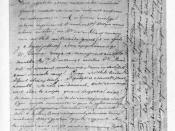Christianity in Dostoyevsky's Crime and Punishment: An Overview Fyodor
Dostoyevsky wrote, " If someone succeded in proving to me that Christ was
outside the truth, and if, indeed, the truth was outside Christ, then I
would sooner remain with Christ than with the truth" (Frank 68). It was by
no means easy for Dostoyevsky to reach this conclusion. In Dostoyevsky's
life, one sees that of an intellectual Prodigal Son, returning to the
Father In Heaven only after all other available systems of belief have
been exhausted. Reared in a devout Russian Orthodox home, Dostoyevsky as a
young man rebelled against his upbringing and embraced the anarchist (and
atheistic) philosophies of the intelligentsia, radical students and middle
class intellectuals violently opposed to the status quo in
Nineteenth-Century Russia (Morsm 50). Dostoyevsky revolutionary stirrings
were not unnoticed by the Tsar's secret police, and, in 1849, Dostoyevsky
was sentenced to a mock execution followed by ten years' hard labor in a
Siberian prison (Morsm 50).
One critic said "It has been customary to
say that Dostoyevsky re-learnt Christianity in prison." (A Boyce Gibson
19.) There, out of his element and surrounded by hardened criminals, he
had plenty of time to contemplate life and read The New Testament (the
only book he was allowed). However, it was not until his compulsory army
service that Dostoyevsky's faith began to blossom. In the army,
Dostoyevsky met a fellow officer and devout Christian named Baron von
Vrangel, who befriended the still young Dostoevesky and helped him
re-discover the Christian faith (Frank 4). Although a professing
Christian for the rest of his life, Dostoyevsky was not a "plaster saint."
(Until he died, he was plagued by doubts and a passion for gambling.)
Instead, Dostoyevsky understood, perhaps better than any other great
Christian author, that his faith was...


